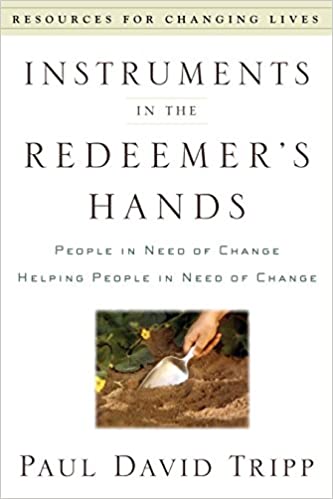A Book Review from Books At a Glance
By Ginny Jacobson
Every human being is trying to make sense out of life and to help others do the same. Counseling literature seeks to aid us in personal transformation and to equip us as we come alongside others. Paul Tripp’s book, Instruments in the Redeemer’s Hands, stands out as a refreshingly empowering approach to counseling by viewing it primarily as informal personal care. Tripp reminds the reader that each believer is called and competent to care for others.
Although Tripp doesn’t give a clear definition of what biblical counseling is, he describes counseling as “the stuff of human life” and argues that “we are always sharing our interpretations with one another … the issue is whether that counseling is rooted in the revelation of the Creator (45-46).” Instruments in the Redeemer’s Hands is an insightful book, filled with practical help to grow believers in their care and counsel of one another.
Counseling as personal ministry, Tripp expounds, “is not about always knowing what to say. It is not about fixing everything in sight that is broken. Personal ministry is about connecting people with Christ so that they are able to think as he would have them think, desire what he says is best, and do what he calls them to do even if their circumstances never get ‘fixed’ (185).”
All Believers Can Counsel
What sets Instruments in the Redeemer’s Hands apart from most contemporary counseling helps is the idea that every believer is equipped to care for others. In an anecdote about a young man asking Tripp to offer counsel for his struggling friend, Tripp tells the young man that “God never gets a wrong address” and had sent the friend to the young man on purpose (17).
Tripp reminds the reader that those who have received the Redeemer’s work in their own lives are competent to care for their fellow believers, neighbors. Tripp notes, “God has called all of his people to be instruments of change in his redemptive hands… God uses ordinary people to do extraordinary things in the lives of others (18).”
Gospel-Centered Counseling Framework
The first five chapters of Instruments in the Redeemer’s Hands sets personal ministry of counsel in the greater overarching gospel storyline of the Bible. Tripp views our need for help as part of our design, not a result of the fall (45). He admonishes that we must not “offer people a system; we point them to a Redeemer (9).” God’s Word must be our primary tool of change (22). Ultimately, Tripp urges, “our mission is to teach, admonish, and encourage one another to rest in his sovereignty, rather than establishing our own; to rely on his grace rather than our performing on our own; and to submit to his glory rather than seeking our own (35).”
Love-Know-Speak-Do
Where many may find Tripp’s book most helpful is in his pattern of counsel in chapters 6-14. He outlines a simple four-part method of care: love-know-speak-do.
Tripp goes into great detail on each of the four parts, with helpful diagrams, anecdotes, and lists of questions. He challenges the reader to love others by entering their world and identifying with their suffering. He explains how believers can ask questions to look for how people experience a situation, problem, or relationship (127, 133). Tripp encourages the reader that asking questions can help someone know their own hearts, discover where change is needed, and see how the gospel applies specifically to individual experiences (224-226). Tripp instructs us to enter into someone’s experience, help them identify their hearts, and point them to the Redeemer. It is in this context of speaking the gospel to their specific experience that Jesus transforms lives through specific change so they can do what God has called them to do.
This love-know-speak-do framework is easily remembered, applied, and transferable to equip others. As a stay at home mom, I am helped to remember to first love my children, husband, and neighbors, making an effort to get to know them, and then look for opportunities to speak gospel truths into the specifics of their lives and help them do what God has called them to do. It is an incredibly simple and helpful pattern not just for individuals, but also for churches and ministries to implement in small groups and as a ministry-wide care model.
Conclusion
Instruments in the Redeemer’s Hands is a much needed guide for counseling as personal ministry. It is a refreshing change to view counseling as not something only for professionals and pastors, but something each believer can and should do in their daily lives informally and formally. I highly recommend this book to help individuals and churches gain a solid gospel-centered and easily applicable framework for the care of others.
Ginny Jacobson is a missionary with the Jesus Film Project and a student in the Master of Arts in Christian Counseling program at Reformed Theological Seminary, Charlotte. She and her husband Andy live in Orlando with their four boys.
